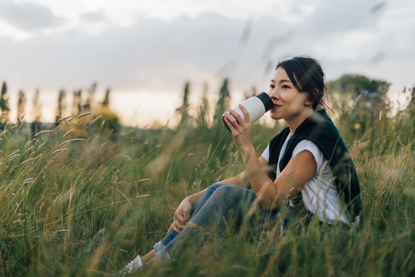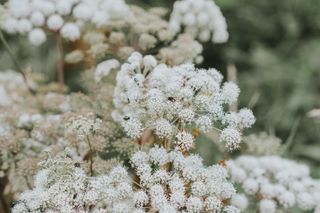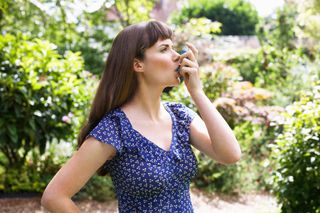Hay fever symptoms and causes
Living with hay fever symptoms is no fun for anyone, but with the right identification and treatment, they can be managed.


Hay fever symptoms can be one of the best (but most uncomfortable) indicators that summer is on the way.
According to Allergy UK, one in four people in the UK have hay fever to some degree. But despite many sufferers knowing that they're susceptible to an itchy nose at the very least, they don't have hay fever remedies prepared in time.
This is because allergy season can really strike anywhere between March and September (and hay fever can even affect babies), so it's difficult to predict when the pollen bomb will hit. Luckily, the symptoms of hay fever are easy to identify, so everything from anti-allergy pillows to the hay fever medication safe for pregnancy can be sorted out quickly.
It's also worth knowing how you can save on hay fever tablets so you're not overpaying unnecessarily.
What are the hay fever symptoms?
The most common hay fever symptoms are:
- Frequent sneezing
- A blocked or runny nose
- Itchy, red or watery eyes
- An itchy throat, mouth, nose or ears
- Persistent coughing
They are less common but people also experience facial or sinus pain, headaches, earaches and tiredness. Some people with hay fever lose their sense of smell, which is why it's important to know the difference between symptoms of hay fever and coronavirus.

Max Wiseberg, airborne allergies expert and founder of HayMax adds, "Another set of symptoms worth mentioning are those caused by ‘oral allergy syndrome’ or ‘OAS’.
"Some hay fever sufferers find that certain foods trigger unpleasant tingling, swelling or redness in their mouths and on their lips when they eat certain foods which contain similar proteins to those found in pollens.
"For example, grass pollen shares a similar protein structure to that found in a selection of fruits and vegetables, including celery, cantaloupe, honeydew, oranges, peaches, tomatoes and watermelon – and thus can trigger a reaction in a hay fever sufferer who is sensitive to grass pollen."
Hay fever and asthma
Hay fever increases the risk of an asthma attack, with around 80% of sufferers saying that the seasonal allergy triggers their condition.
This is because hay fever causes already-inflamed airways to swell even more, leaving the asthma sufferer breathless. The inflamed airways are then also more likely to react to other triggers, leading to an attack.

Speak to your doctor if you have asthma and hay fever, as you may experience wheezing and shortness of breath, and need to adjust your dose of medication.
Hay fever causes
Hay fever, otherwise known as seasonal allergic rhinitis, is usually caused by the pollen count. Although, it can be induced by other allergens such as dust mites. Hay fever symptoms can occur because your body is mistakenly seeing pollen as a threat, so your immune system is attempting to prevent the perceived 'infection' from spreading.
Pollen counts are generally higher in the early morning or the late evening, and most sufferers start experiencing symptoms within the first 15 minutes of exposure.
How severe your symptoms of hay fever are will depend on the pollen count that day. The weather also plays a roll, as there's more pollen in the air on a hot, dry day than a wet and cloudy one.
Some factors can worsen the condition, such as drinking alcohol as it contains histamine, which sets of allergic reactions within the body. These are some others...

Grass
Grass pollen is the most common allergen, affecting an estimated 95% of hay fever sufferers. The season for grass pollen begins in late May, and continues until early August.
Trees
While it's less common, affecting around 25% of sufferers, tree pollen can also cause hay fever symptoms. Trees start to release their pollen from March-May.
Weeds
Dock, mugwort, nettle and oilseed rape are the main sources of weed pollen. They're generally in the air from April to mid June.
Flowers
Certain flowers, such as lilies, sunflowers and jasmine produce more pollen than others, and should be avoided if you have hay fever. Insect pollinated flowers, such as pansies, peonies, orchids, hydrangea and primrose, have thicker, stickier pollen that remains on the plant, and therefore cause less irritation.
Preventing hay fever symptoms
While hay fever symptoms can be extremely discomforting, especially if you suffer with other respiratory conditions, but there are ways to reduce symptoms in advance of hay fever season.
You can minimise your symptoms by:
- Keeping doors and windows closed
- Wearing wraparound sunglasses to stop pollen getting into your eyes
- Changing your clothes after spending time outside
- Drying your clothes indoors
- Dusting and hoovering your home regularly
- Exercise (indoors) and eat a healthy diet
- Avoiding smoking, either personally or around others
- Taking an over-the-counter medication
- Trying a natural hay fever remedy
There are also well-known hacks and tricks, such as using Vaseline to prevent pollen from entering the body.

What does the NHS say about hay fever treatments?
The NHS advises that mild-to-moderate hay fever can be treated with over-the-counter remedies and at-home treatments. You only need to see your GP if:
- Your hay fever symptoms can't be treated with over-the-counter medications, or you have difficult side effects from the medication.
- You're experiencing persistent complications of hay fever, such as asthma getting worse or repeated episodes of sinusitis.
- The pattern of your symptoms is unusual. For example, it only occurs during the winter or only at your workplace. This might be hay fever, or it could be allergies caused by something other than pollen. Further testing would be needed to confirm this.
If you have any of the common Covid-19 symptoms (loss of taste or smell, persistent coughing, high temperature), do not go to your GP. Self-isolate and order a PCR test before seeking further in-person treatment.
Goodto Newsletter
Parenting advice, hot topics, best buys and family finance tips delivered straight to your inbox.

Grace Walsh is a Features Writer for Goodto.com, covering breaking news health stories during the Covid-19 pandemic as well as lifestyle and entertainment topics. She has worked in media since graduating from the University of Warwick in 2019 with a degree in Classical Civilisation and a year spent abroad in Italy. It was here that Grace caught the bug for journalism, after becoming involved in the university’s student newspaper and radio station.
-
 Psychologist-approved tips on how to best prepare kids for changes at home as Rochelle Humes shares adorable note left by 6-year-old daughter Valentina
Psychologist-approved tips on how to best prepare kids for changes at home as Rochelle Humes shares adorable note left by 6-year-old daughter ValentinaValentina picks up on what will help her mummy while daddy is away
By Selina Maycock Published
-
 Does your relationship pass the 'Beckham Test'? The viral trend is taking TikTok by storm, so how does your partner compare to the world-famous footballer?
Does your relationship pass the 'Beckham Test'? The viral trend is taking TikTok by storm, so how does your partner compare to the world-famous footballer?Is your relationship as strong as David and Victoria's? We share what the 'Beckham Test' is and how to try it for yourself
By Ellie Hutchings Published